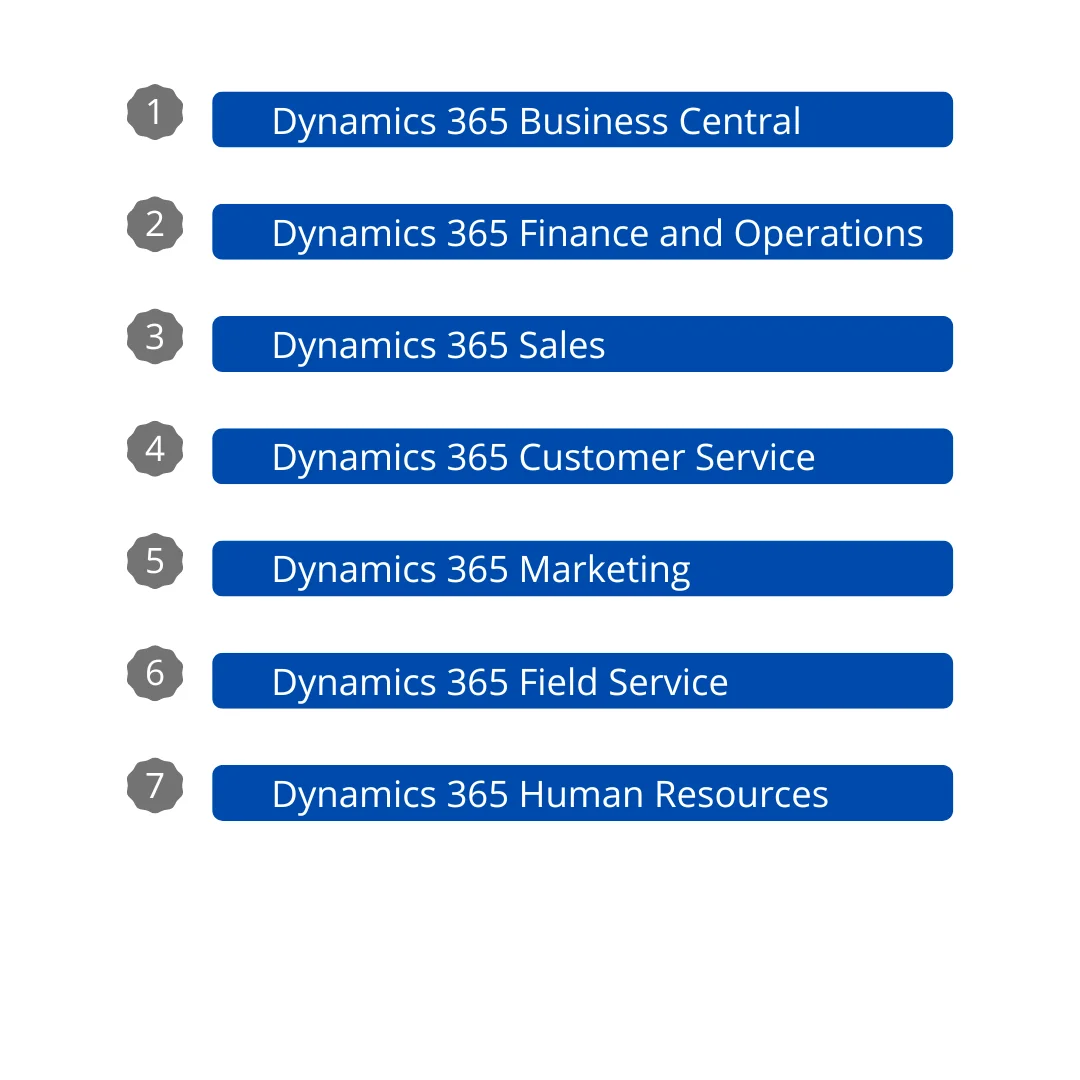
Posted on Saturday, Jul 08th, 2023
Transforming Customer Relationships with Dynamics 365
Microsoft Dynamics 365, also referred to as D365, is a cloud-based platform developed by Microsoft that combines enterprise resource planning (ERP) and customer relationship management (CRM) functionalities. It integrates various business functions and offers a suite of applications designed to help organizations manage their operations more efficiently.
An Overview of How D365 Works
Dynamics 365 (D365) is a comprehensive suite of business applications that combines customer relationship management (CRM) and enterprise resource planning (ERP) functionalities. It is designed to help organizations manage various aspects of their operations, including sales, marketing, customer service, finance, supply chain, and more. Here's an overview of how D365 work:1. Cloud-Based Platform
D365 operates on the cloud, which means the software and data are hosted on Microsoft's servers rather than being installed on local machines. This cloud-based architecture provides flexibility, scalability, and easy access to the system from different devices and locations.2. Modular Structure
D365 is composed of modular applications that cover different aspects of business operations, such as sales, marketing, customer service, finance, operations, human resources, and more. Each module focuses on a specific area and provides functionalities tailored to that domain.3. Integration and Data Sharing
The various modules in D365 are designed to work together seamlessly. They share a common data model, allowing data to flow between different applications within the system. This integration ensures that information is consistent across departments and enables a unified view of customer interactions and business processes.4. Customization and Configuration
It offers a high degree of flexibility to meet the specific needs of different organizations. The platform can be customized and configured to align with unique business processes and requirements. Users can modify fields, forms, workflows, and business rules to adapt the system to their workflows and automate repetitive tasks.5. Analytics and Reporting
It provides robust reporting and analytics capabilities. It captures data from various sources and allows users to generate reports, create dashboards, and gain insights into key performance indicators (KPIs). These analytics help businesses make informed decisions, identify trends, and improve overall performance.6. Artificial Intelligence and Automation
It incorporates artificial intelligence (AI) capabilities to enhance productivity and efficiency. AI features, such as predictive analytics, chatbots, virtual agents, and machine learning algorithms, enable automation of routine tasks, deliver personalized customer experiences, and provide intelligent insights for better decision-making.7. Security and Compliance
Microsoft takes security and compliance seriously in D365. The platform implements robust security measures, including encryption, access controls, data backup, and disaster recovery. It also adheres to industry standards and regulatory requirements, helping organizations maintain data privacy and meet compliance obligations.8. Continuous Updates
It is regularly updated by Microsoft with new features, bug fixes, and performance enhancements. These updates are seamlessly deployed to the cloud environment, eliminating the need for manual software updates and ensuring that users have access to the latest functionalities.Editions of D365
Microsoft Dynamics 365 (D365) is available in several editions, each tailored to specific business needs and requirements. Here are the main editions of D365:
1. Dynamics 365 Business Central
This edition is designed for small and medium-sized businesses (SMBs). It provides a comprehensive set of ERP functionalities, including financial management, sales, purchasing, inventory, manufacturing, and project management. Business Central offers an intuitive user interface and is easily customizable to fit the unique needs of SMBs.2. Dynamics 365 Finance and Operations
Formerly known as Dynamics AX, this edition caters to larger enterprises and organizations with complex financial and operational requirements. It provides extensive capabilities for financial management, supply chain management, manufacturing, retail, human resources, and more. Finance and Operations supports multi-site and multi-country operations, making it suitable for global enterprises.3. Dynamics 365 Sales
This edition focuses on sales force automation and customer relationship management (CRM). It helps sales teams manage leads, opportunities, contacts, and accounts effectively. Sales analytics and forecasting tools assist in tracking performance and making data-driven decisions. Integration with other D365 modules allows for a seamless flow of information across the organization.4. Dynamics 365 Customer Service
This edition is designed to enhance customer service and support operations. It provides tools for case management, knowledge base management, service scheduling, and omni-channel engagement. Customer Service empowers organizations to deliver personalized and efficient customer experiences, resulting in improved customer satisfaction and loyalty.5. Dynamics 365 Marketing
This edition enables organizations to create and execute marketing campaigns, nurture leads, and track marketing performance. It includes features for email marketing, customer segmentation, lead scoring, and marketing automation. Integration with other D365 modules facilitates the alignment of marketing activities with sales and customer service processes.6. Dynamics 365 Field Service
This edition targets organizations that provide field services, such as maintenance, repair, and installation. It offers capabilities for managing service orders, resource scheduling, mobile field communication, and inventory management. Field Service optimizes service delivery, improves response times, and enables field technicians to access real-time information.7. Dynamics 365 Human Resources
This edition focuses on human capital management and HR processes. It includes features for personnel management, benefits administration, performance management, employee self-service, and workforce analytics. Human Resources streamlines HR operations and empowers organizations to attract, retain, and develop top talent.These editions can be combined or customized to meet specific business requirements. Microsoft also provides industry-specific solutions built on the D365 platform, such as Dynamics 365 Retail, Dynamics 365 for Manufacturing, Dynamics 365 for healthcare, and more, which offer additional functionalities tailored to specific sectors.
D365 Applications and Modules
Dynamics 365 consists of various modules and applications that cater to different aspects of business operations. Some of the key modules and applications within Dynamics 365:1. Sales
The Sales module focuses on sales force automation and customer relationship management. It helps manage leads, opportunities, contacts, and accounts, enabling sales teams to track interactions, close deals, and forecast sales. Features include pipeline management, sales analytics, territory management, and collaboration tools.2. Customer Service
The Customer Service module is designed to enhance customer support and service operations. It provides functionalities for case management, knowledge base management, service level agreements (SLAs), omni-channel engagement, and self-service portals. It enables organizations to deliver personalized and efficient customer experiences.3. Marketing
The Marketing module facilitates marketing campaign management and lead nurturing. It includes features for email marketing, customer segmentation, lead scoring, campaign automation, and marketing analytics. The module enables organizations to create targeted campaigns, track marketing performance, and generate leads for the sales team.4. Field Service
The Field Service module caters to organizations that provide field services, such as maintenance, repair, and installation. It offers capabilities for work order management, resource scheduling, mobile field communication, inventory management, and IoT integration. Field Service optimizes service delivery, improves response times, and empowers field technicians with real-time information.5. Finance and Operations
Formerly known as Dynamics AX, the Finance and Operations module provides comprehensive ERP functionalities for financial management, supply chain management, manufacturing, retail, and more. It includes features such as general ledger, accounts payable, accounts receivable, inventory management, procurement, production control, and project accounting.6. Human Resources
The Human Resources module focuses on human capital management and HR processes. It includes features for personnel management, benefits administration, performance management, employee self-service, absence management, and workforce analytics. The module streamlines HR operations and supports talent acquisition, development, and retention.7. Project Operations
The Project Operations module helps organizations manage projects effectively. It provides functionalities for project planning, resource management, time and expense tracking, project accounting, and project analytics. It allows project-based businesses to monitor project progress, allocate resources, and track financials.8. Commerce
The Commerce module enables organizations to manage their e-commerce operations. It includes features for online storefronts, product catalogs, pricing, inventory management, order management, and customer service. Commerce integrates with other Dynamics 365 modules to provide a seamless end-to-end customer experience.9. Supply Chain Management
The Supply Chain Management module focuses on optimizing supply chain operations. It includes features for inventory management, demand forecasting, procurement, production planning, warehouse management, and transportation management. The module helps organizations streamline their supply chain processes and improve efficiency.These are just some of the modules and applications available in Dynamics 365. Microsoft continues to expand and refine the capabilities of Dynamics 365, offering additional industry-specific solutions and integrating emerging technologies like AI and IoT to enhance business operations.
Uses for Microsoft D365
Microsoft Dynamics 365 (D365) is a versatile platform with a wide range of uses across various industries and business functions. Here are some common uses for Microsoft Dynamics 365:1. Customer Relationship Management (CRM)
D365 offers robust CRM capabilities, allowing organizations to manage customer relationships effectively. It helps track customer interactions, manage leads and opportunities, and improve sales processes. D365 CRM enables organizations to deliver personalized customer experiences, enhance customer satisfaction, and build long-term relationships.2. Sales Management
D365's sales management features assist sales teams in tracking leads, managing sales pipelines, and closing deals. It provides insights into sales performance, facilitates collaboration among team members, and enables efficient sales forecasting. Sales managers can use D365 to monitor sales activities, analyze sales data, and make informed decisions.3. Marketing Automation
D365 includes marketing automation tools that help organizations plan, execute, and analyze marketing campaigns. It facilitates lead nurturing, enables targeted marketing based on customer segmentation, and provides analytics to measure campaign effectiveness. D365 marketing capabilities empower organizations to drive customer engagement, generate leads, and optimize marketing ROI.4. Customer Service and Support
D365 enables organizations to deliver exceptional customer service and support experiences. It provides features for case management, knowledge base management, self-service portals, and omni-channel engagement. Customer service teams can leverage D365 to resolve customer issues efficiently, improve response times, and provide personalized support across various channels.5. Financial Management
D365 offers comprehensive financial management functionalities, including general ledger, accounts payable, accounts receivable, budgeting, and financial reporting. It streamlines financial operations, provides real-time visibility into financial data, and supports accurate financial planning and analysis. D365 helps organizations maintain financial compliance and make informed financial decisions.6. Supply Chain Management
D365's supply chain management capabilities cover areas such as procurement, inventory management, demand forecasting, production planning, and logistics. It enables organizations to optimize supply chain operations, streamline procurement processes, track inventory in real-time, and improve supply chain efficiency. D365 helps organizations meet customer demands, reduce costs, and enhance overall supply chain performance.7. Field Service Management
D365's field service management capabilities cater to businesses that provide field services. It offers functionalities for work order management, resource scheduling, mobile field communication, and inventory management. Organizations can use D365 to optimize field service operations, improve technician productivity, and enhance customer satisfaction.8. Project Management
D365 provides project management tools to plan, execute, and track projects effectively. It includes features for project planning, resource management, time and expense tracking, and project accounting. D365 project management capabilities help organizations monitor project progress, allocate resources efficiently, and ensure projects are completed on time and within budget.These are just a few examples of the uses for Microsoft Dynamics 365. The platform's modular structure and flexibility allow it to be customized and adapted to specific industry requirements, making it applicable across a wide range of businesses and sectors.
Dynamics 365 vs Dynamics CRM
Dynamics 365 and Dynamics CRM refer to two different iterations of Microsoft's customer relationship management (CRM) software. Dynamics 365 for Sales features the same core sales and marketing features seen in the most recent version of Dynamics CRM. Here are the key differences between Dynamics 365 and Dynamics CRM:1. Integrated Suite vs. Standalone Application
Dynamics CRM was a standalone application focused solely on CRM capabilities, while Dynamics 365 is an integrated suite of business applications. Dynamics 365 encompasses not only CRM but also enterprise resource planning (ERP), artificial intelligence, data analytics, field service, and more. It offers a unified platform that combines multiple business functions into a single system.2. Licensing and Deployment Options
Dynamics CRM had a traditional licensing model where customers could purchase licenses outright and deploy the software on their own servers or data centers. Dynamics 365, on the other hand, is primarily offered through a cloud-based subscription model. It provides customers with the flexibility to choose from various subscription plans based on their specific needs and access the software as a service (SaaS) via the Microsoft Azure cloud.3. Modular Approach
Dynamics CRM was released as a monolithic software package with all CRM functionalities bundled together. In contrast, Dynamics 365 follows a modular approach, allowing organizations to choose and license the specific applications and modules they require. For example, a company can subscribe to Dynamics 365 Sales or Dynamics 365 Customer Service individually, or combine multiple modules to create a customized solution.4. Common Data Service (CDS)
Dynamics 365 introduced the Common Data Service (CDS), which serves as a central repository for data storage and management across the various applications within the Dynamics 365 suite. CDS enables seamless integration and data sharing between different modules, eliminating data silos and providing a unified view of customer information.5. Power Platform Integration
Dynamics 365 is tightly integrated with the Microsoft Power Platform, which includes Power Apps, Power BI, and Power Automate (previously known as Microsoft Flow). This integration empowers users to extend and customize Dynamics 365 functionality, create custom applications, build reports and dashboards, and automate business processes.6. Continuous Updates and Innovation
Dynamics 365 follows a continuous release cycle, where new features, enhancements, and updates are regularly rolled out to customers. This ensures that organizations using Dynamics 365 always have access to the latest capabilities and innovations without the need for extensive upgrades or migrations.While Dynamics CRM served as a foundation for the evolution of Microsoft's CRM offerings, Dynamics 365 represents a broader, more flexible, and integrated suite of business applications. It provides organizations with a comprehensive platform to manage their customer relationships, streamline their operations, and drive digital transformation across their entire business ecosystem.
Wrapping-Up
Dynamics 365 (D365) presents a game-changing opportunity for organizations seeking to harness the power of technology to drive their success. We understand the immense potential of the technology in revolutionizing business operations and delivering exceptional customer experiences.Blue Summit is committed to guiding organizations through their D365 journey, providing expert consultation, implementation, and support services. We recognize the transformative potential of D365 in helping businesses achieve their goals, streamline operations, and drive growth.
Blue Summit has collaborated with OdiTek Solutions, a frontline custom software development company. It is trusted for its high service quality and delivery consistency. Visit our partner's page today and get your business streamlined.
REFER TO OTHER RELEVANT CONTENTS

MEAN Stack Development
It's crucial to have a standardized, consistent software stack when creating a new application. Utilizing a collection of solutions that are made to function together will simplify resources and cut down on development time for your back-end. The stack field is becoming congested, though. There...
read more








